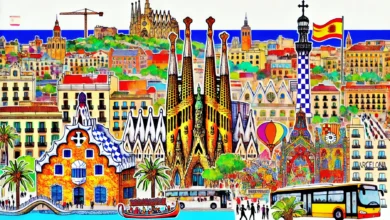Discover Spain: The Ultimate Guide for a Successful Business and Tourism Trip

Introduction
Spain, a land of vibrant culture, breathtaking landscapes, and a thriving economy, has become a top destination for both business and leisure travelers. Whether you’re exploring Spain’s rich history, enjoying its world-famous cuisine, or attending a high-profile business meeting, Spain offers an unparalleled experience that seamlessly blends the old with the new. This guide will provide you with everything you need to know to make the most of your trip to Spain, ensuring it is both successful and enjoyable.
Why Choose Spain for Business and Tourism?
1. A Thriving Business Hub
Spain is not only famous for its tourist attractions but also for being a significant player in the global business arena. With a GDP ranking among the top 15 economies in the world, Spain offers a stable and dynamic environment for business. Key industries include tourism, automotive, fashion, agriculture, and technology. Spain’s strategic location, connecting Europe, Africa, and the Americas, makes it an ideal gateway for international trade.
The country boasts modern infrastructure, including extensive high-speed rail networks, world-class airports, and state-of-the-art conference facilities. Madrid and Barcelona, the two largest cities, are home to numerous multinational corporations, prestigious business schools, and international trade fairs, making them ideal locations for business activities.
Visit https://www.diariodelexportador.com/2024/05/espana-destino-ideal-para-negocios.html
2. Rich Cultural Heritage and Tourist Attractions
Spain’s cultural heritage is as diverse as it is rich. From the stunning architecture of Antoni Gaudí in Barcelona to the Moorish palaces in Andalusia, the country is a treasure trove of historical landmarks. Visitors can explore the medieval streets of Toledo, relax on the sunny beaches of the Costa del Sol, or enjoy the vibrant nightlife of Madrid.
Spain is also home to 49 UNESCO World Heritage Sites, the third-highest number in the world, including the Alhambra, the Sagrada Familia, and the historic city of Salamanca. This blend of history, art, and modernity makes Spain a must-visit destination for tourists.
Planning Your Trip
1. Best Time to Visit
Spain’s climate varies significantly from region to region, so the best time to visit depends on your destination and the purpose of your trip.
- Spring (March to May): Ideal for visiting cities like Madrid and Barcelona when the weather is pleasant and cultural festivals abound.
- Summer (June to August): Perfect for beach destinations like Ibiza, Mallorca, and the Costa Brava. However, it’s also peak tourist season, so expect crowds.
- Autumn (September to November): A great time to visit wine regions like La Rioja and enjoy mild weather with fewer tourists.
- Winter (December to February): Best for a visit to southern regions like Andalusia or for a skiing trip in the Pyrenees.
2. Essential Travel Documents
For most visitors, a valid passport is required to enter Spain. EU citizens can enter with just an ID card, while travelers from non-EU countries may need a visa. It’s advisable to check the specific requirements based on your nationality. For business travelers, obtaining a Schengen visa allows access to Spain and other Schengen Area countries.
3. Getting Around
Spain’s transportation system is highly efficient and user-friendly.
- Air Travel: Spain has several major international airports, with Madrid-Barajas and Barcelona-El Prat being the busiest.
- Trains: The AVE high-speed train network connects major cities like Madrid, Barcelona, Seville, and Valencia, offering a fast and comfortable way to travel.
- Car Rental: Renting a car is an excellent option for exploring the countryside or coastal areas. Spain has an extensive network of highways, making road travel convenient.
- Public Transport: Cities like Madrid and Barcelona have extensive metro and bus networks, making it easy to navigate urban areas.
Top Destinations for Business and Tourism
1. Madrid: The Heart of Spain
Madrid, the capital city, is a bustling metropolis that perfectly balances business and pleasure.
- Business Opportunities: Madrid is home to numerous multinational companies and hosts major international events like the FITUR tourism fair and the Madrid International Auto Show.
- Tourist Attractions: Must-see sites include the Royal Palace, the Prado Museum, and the lively Gran Vía shopping street. For a taste of local culture, visit the historic neighborhood of La Latina or enjoy a traditional Spanish meal at a tapas bar.
2. Barcelona: A City of Innovation and Art
Barcelona, known for its unique architecture and vibrant culture, is a hub for innovation and creativity.
- Business Opportunities: Barcelona is a leading destination for tech startups and hosts the annual Mobile World Congress, attracting professionals from around the globe.
- Tourist Attractions: Visitors can explore Gaudí’s masterpieces like the Sagrada Familia and Park Güell, stroll down the famous La Rambla, or relax on the city’s beautiful beaches.
3. Seville: The Soul of Andalusia
Seville, the capital of Andalusia, is famous for its flamenco music, Moorish architecture, and lively festivals.
- Business Opportunities: While Seville is more known for tourism, it also offers opportunities in the agricultural and renewable energy sectors.
- Tourist Attractions: Highlights include the Alcázar Palace, Seville Cathedral, and the vibrant Triana neighborhood. Don’t miss the chance to experience a traditional flamenco show.
4. Valencia: A Blend of Tradition and Modernity
Valencia, Spain’s third-largest city, is known for its futuristic architecture and the famous Fallas festival.
- Business Opportunities: Valencia is a significant player in the agricultural industry and is also emerging as a tech hub.
- Tourist Attractions: Key sites include the City of Arts and Sciences, the historic Mercado Central, and the beautiful Turia Gardens.
Experiencing Spanish Culture
1. Cuisine
Spanish cuisine is world-renowned for its diversity and flavor.
- Tapas: Small dishes like patatas bravas, jamón ibérico, and croquettes are perfect for sharing.
- Paella: Originating from Valencia, this rice dish is a must-try.
- Wine: Spain is one of the world’s top wine producers, with regions like La Rioja and Ribera del Duero offering excellent varieties.
2. Festivals
Spain’s festivals are a vibrant expression of its culture.
- La Tomatina (Buñol): A fun and messy tomato-throwing festival held in August.
- Semana Santa (Holy Week): Celebrated across Spain with religious processions, particularly famous in Seville.
- Running of the Bulls (Pamplona): A thrilling event held during the San Fermín festival in July.
3. Flamenco
Flamenco, a passionate dance and music form, is a quintessential part of Spanish culture. To experience authentic flamenco, visit a tablao in Andalusia.
Tips for a Successful Business Trip
1. Business Etiquette
Understanding Spanish business culture is key to a successful trip.
- Language: While many business professionals speak English, learning a few basic Spanish phrases can go a long way.
- Punctuality: Spaniards appreciate punctuality, although meetings may start a few minutes late.
- Networking: Building personal relationships is crucial in Spanish business culture. Don’t rush into business discussions; take time to build rapport.
2. Accommodation
Spain offers a wide range of accommodation options, from luxury hotels to budget-friendly hostels.
- Business Hotels: Cities like Madrid and Barcelona have numerous hotels equipped with conference rooms, business centers, and high-speed internet.
- Boutique Hotels: For a more personalized experience, consider staying in a boutique hotel, which often offers unique decor and excellent service.
3. Safety and Health
Spain is generally a safe country, but it’s always wise to take precautions.
- Health Insurance: Ensure you have adequate health insurance, especially if you’re not an EU citizen.
- Emergency Numbers: The emergency number in Spain is 112.
Conclusion
Spain is a country that offers something for everyone, whether you’re visiting for business or pleasure. With its rich cultural heritage, modern infrastructure, and welcoming atmosphere, Spain ensures a successful and memorable trip. By following this guide, you’ll be well-prepared to make the most of your time in this beautiful and dynamic country.



